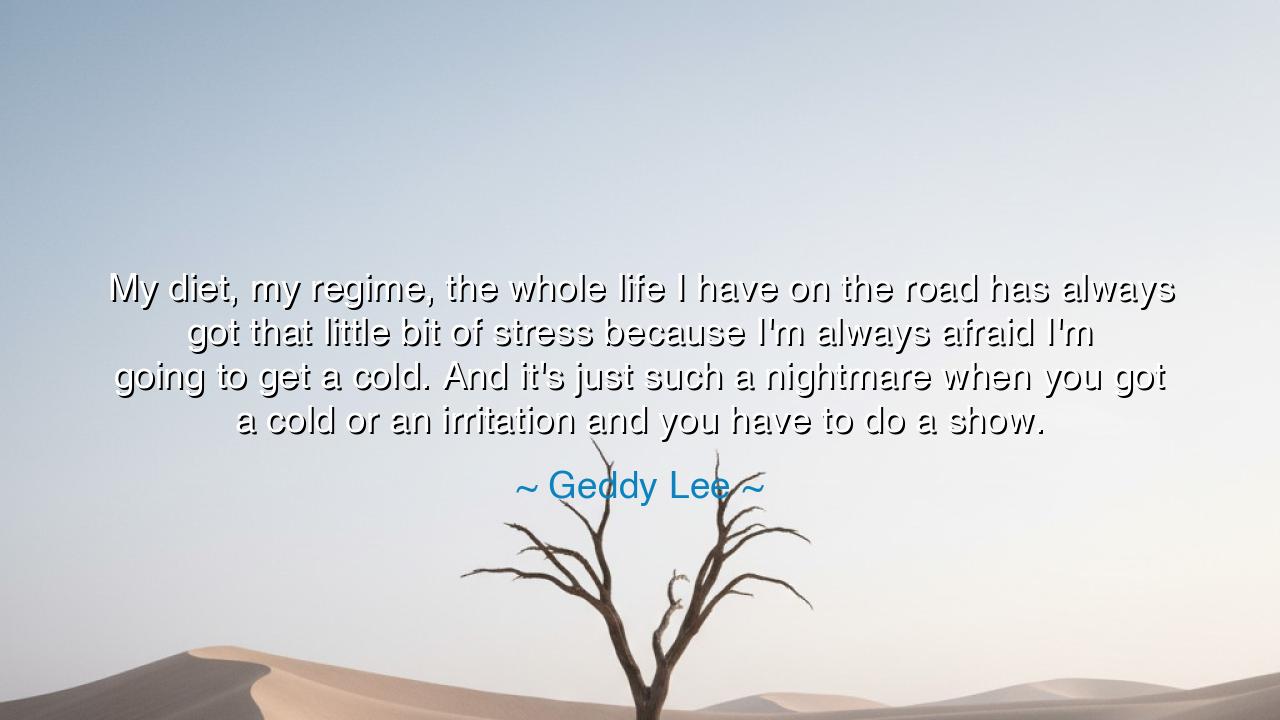
My diet, my regime, the whole life I have on the road has always
My diet, my regime, the whole life I have on the road has always got that little bit of stress because I'm always afraid I'm going to get a cold. And it's just such a nightmare when you got a cold or an irritation and you have to do a show.






"My diet, my regime, the whole life I have on the road has always got that little bit of stress because I'm always afraid I'm going to get a cold. And it's just such a nightmare when you got a cold or an irritation and you have to do a show." These words, spoken by the legendary Geddy Lee, touch upon the fragility of the human body and the immense pressure that accompanies a life lived under constant scrutiny. To understand the depth of this statement, we must reflect on the nature of commitment, and how, in the pursuit of excellence, even the smallest of ailments—those fleeting irritations of the body—can feel like insurmountable barriers. Lee's words speak of the constant vigilance required in the life of an artist, one whose livelihood depends on their physical health and performance.
The stress that Lee refers to is not just the strain of travel or the rigors of an intense touring schedule. It is the fear that the body, that sacred vessel, might fail at the most critical of moments. The performer, whether on the stage or in any arena of life, must balance between mind and body, knowing that even the smallest cold, the slightest irritation, can turn a grand performance into an ordeal. This is a lesson shared by many who have lived in the spotlight, those whose careers depend on their ability to show up, to perform, to give of themselves to the world despite the weaknesses of the flesh.
Consider, if you will, the story of Hercules, the great hero of ancient Greece, who, despite his unmatched strength, faced trials and tribulations that tested even his body. One of his greatest feats was the completion of the Twelve Labors, each more difficult than the last. But even he was not immune to suffering, and he was often brought to the edge of his strength by small, seemingly insignificant things. In one of his tasks, Hercules was tasked with cleaning the Augean Stables, a nearly impossible feat due to the vast amounts of filth accumulated within. Yet, in the face of this labor, Hercules did not falter, for he knew that resilience was born not just of strength, but of the ability to persist despite the burdens of the body.
Much like Hercules, Geddy Lee's life as a musician on the road requires constant vigilance. The very act of performing demands not just mental focus, but the physical endurance to withstand the strain that comes with hours of rehearsal, travel, and performance. His fear of a cold or irritation represents a broader concern that many of us can relate to: the fragility of our bodies and the stress we feel when we rely on them to perform at their best, despite the inevitable wear and tear that life imposes.
The lesson we must take from Lee’s words is not merely about health, but about resilience and adaptability in the face of adversity. It is about understanding that life, especially one lived with ambition and purpose, will always present obstacles. We will face illness, fatigue, and frustration, and yet we must continue. Like the ancient warriors who faced not just the enemy, but the harsh conditions of battle, we too must learn to adapt and to carry on despite the inevitable setbacks of the body. It is this inner strength, this determination to perform despite the body’s limitations, that marks the true character of those who succeed in their endeavors.
We are reminded here of the philosophers of old, who taught that true greatness lies not in the absence of hardship, but in the ability to persevere through it. Socrates, when confronted with the challenges of his own time, did not shy away from the difficulties that arose in his life. He faced them head-on, always keeping his mind focused on the task at hand, on the pursuit of truth and wisdom. Likewise, Geddy Lee's words reveal a similar philosophy: that even when the body fails or falters, the mind—the spirit—must remain unbroken. It is in these moments of stress and adversity that we prove our worth, that we embrace the challenge and rise above the limitations that threaten to hold us back.
In our own lives, we must learn from this example. Whether we are artists, athletes, or simply individuals navigating the challenges of daily existence, we must develop a resilience that allows us to face the storms of life—be they physical, mental, or emotional. When we feel weak, when we are burdened by stress or illness, let us remember that it is not the lack of struggle that defines us, but our ability to press on despite it.
So, let us take a page from the life of Geddy Lee. In his words, we find a call to arms—not against an external enemy, but against the limitations of the body and the stresses of the mind. Let us adapt to the challenges that life presents, let us nurture our bodies with care and caution, but above all, let us persist in the face of adversity, knowing that true strength is found not in avoiding obstacles, but in the courage to face them, to perform despite them, and to emerge stronger on the other side.






AAdministratorAdministrator
Welcome, honored guests. Please leave a comment, we will respond soon